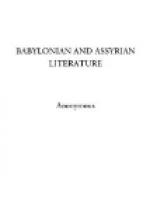L
The list of my victories and the catalogue of my triumphs over foreigners hostile to Ashur, which Anu and Vul have granted to my arms, I have inscribed on my tablets and cylinders, and I have placed them to the last days in the temple of my Lords Anu and Vul, and the tablets of Shamsi-Vul, my ancestor, I have raised altars and sacrificed victims (before them), and set them up in their places.
LI
In after-times, and in the latter days ...,[1] if the temple of the great gods, my Lords Anu and Vul, and these shrines should become old and fall into decay, may the prince who comes after me repair the ruins. May he raise altars and sacrifice victims before my tablets and cylinders, and may he set them up again in their places, and may he inscribe his name on them together with my name. As Anu and Vul, the great gods, have ordained, may he worship honestly with a good heart and full trust.
[Footnote 1: Lacuna.]
LII
Whoever shall abrade or injure my tablets and cylinders, or shall moisten them with water, or scorch them with fire, or expose them to the air, or in the holy place of god shall assign them a position where they cannot be seen or understood, or who shall erase the writing and inscribe his own name, or who shall divide the sculptures, and break them off from my tablets,
LIII
Anu and Vul, the great gods, my Lords, let them consign his name to perdition; let them curse him with an irrevocable curse; let them cause his sovereignty to perish; let them pluck out the stability of the throne of his empire; let not offspring survive him in the kingdom;[1] let his servants be broken; let his troops be defeated; let him fly vanquished before his enemies. May Vul in his fury tear up the produce of his land. May a scarcity of food and of the necessaries of life afflict his country. For one day may he not be called happy. May his name and his race perish in the land.
In the month of Kuzallu[2] on the 29th day, in the High-Priesthood of Ina-iliya-hallik, (entitled) Rabbi-turi.
[Footnote 1: Doubtful and faulty in text.]
[Footnote 2: Chisleu.]
THE REVOLT IN HEAVEN
TRANSLATED BY H. FOX TALBOT, F.R.S.
This curious narrative is found on a cuneiform tablet in the British Museum. The original text is published in Plate 42 of Delitzsch’s work, “Assyrische Lesestucke.” I gave a translation of it in the “Transactions of the Society of Biblical Archaeology,” Vol. IV, pp. 349-362.




